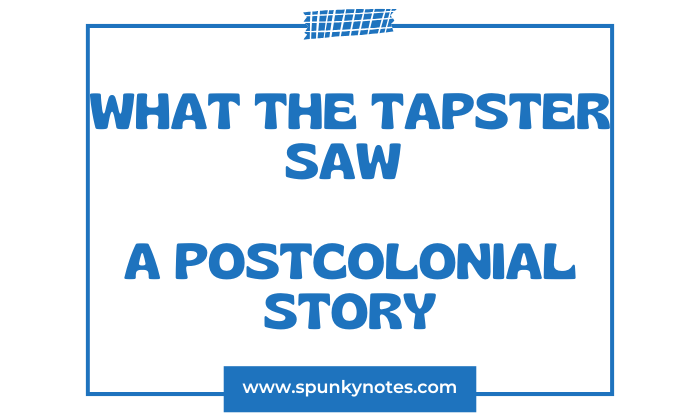
Q. Discuss Ben Okri’s short story What the Tapster Saw as a Postcolonial Story.
Introduction
Ben Okri’s What the Tapster Saw is an important postcolonial story. It addresses environmental and social problems caused by colonial and neo-colonial exploitation in Nigeria.
The story shows how foreign powers and local leaders use the country’s natural resources, especially oil, without considering the people or the environment.
The tapster’s strange and dreamlike visions represent issues such as environmental destruction, displacement of people, corrupt leadership, and the conflict between local beliefs and foreign influence. Okri’s story reflects the lasting effects of colonialism on Nigerian society.
Postcolonial Perspective
From a postcolonial perspective, Ben Okri’s What the Tapster Saw highlights the lasting impact of colonial exploitation on Nigeria’s environment and people.
Colonialism in Africa was marked by the extraction of natural resources for the benefit of European powers, with little regard for the well-being of the local populations or the environment.
Even after gaining independence, many postcolonial states, like Nigeria, found themselves caught in a new form of exploitation known as neo-colonialism.
In this context, foreign corporations continued to dominate the resource-rich areas of these countries, with the support of local elites. Okri’s story draws attention to these ongoing practices, emphasizing how they have devastated Nigeria’s environment and disrupted the lives of its people.
Environmental Exploitation
The story’s portrayal of environmental devastation directly ties to the colonial exploitation of Nigeria’s resources, particularly oil. This theme relates to Nigeria’s postcolonial experience of resource extraction.
During colonial times, and continuing after independence, foreign companies took control of Nigeria’s natural resources, especially oil. They did this with little care for the local people or the environment.
The story shows this destruction through the tapster’s visions of dead trees, poisoned rivers, and barren landscapes. These images reflect the real environmental damage in places like the Niger Delta, heavily affected by oil spills and deforestation.
The sign that says “Delta Oil Company: Trespassers Will Be Persecuted” shows how foreign companies and local leaders have seized control of land and resources. They treat the land as their property and profit from the oil, while local people suffer.
This mirrors how colonial powers once took land from Africans for their benefit. In the story, the poisoned landscape represents the real-world damage caused by oil extraction in places like the Niger Delta.
Displacement and Human Suffering
In postcolonial literature, displacement is a significant issue, and this theme is evident in Okri’s story. As foreign companies exploit natural resources, they force people to leave their homes and traditional way of life.
The tapster’s visions of skeletons along the roads and burning forests symbolize the suffering of people who have been displaced. In real life, oil spills, deforestation, and other environmental problems in Nigeria have driven many people from their homes and farms.
The strange meals in the tapster’s visions, like “pulped chameleons and millipedes,” show the hardships faced by people who no longer have access to clean food and water. This reflects the real suffering of those impacted by pollution and environmental damage.
Many communities in these areas struggle to survive without access to basic resources like clean water and food. Okri uses these grotesque meals to illustrate the extreme human suffering caused by environmental destruction.
Corrupt Leadership
A common theme in postcolonial literature is the critique of local leadership that collaborates with foreign powers for personal gain. In What the Tapster Saw, the corrupt leadership allows foreign companies to exploit the country’s resources.
Even after colonial rule ended, many local leaders became part of the problem by supporting foreign corporations. These leaders allowed companies to take resources from the country in exchange for personal gain.
The story reflects this partnership between corrupt leaders and foreign companies through scenes of misrule and corruption. For example, the man reading the Bible upside down shows the failure of local leaders.
Instead of helping their people and protecting the land, these leaders prioritize their wealth. The upside-down Bible represents their loss of values. They collaborate with foreign companies to get rich, while their people suffer.
This is common in many postcolonial states, where leaders allow foreign companies to exploit resources in exchange for personal wealth. The phrase “You humans only understand pain” shows how leaders and foreign companies justify their actions.
By causing pain, they ensure that people follow their rules. Okri criticizes leaders who put their interests above their people’s needs. He shows that, even after independence, many African nations remain controlled by corrupt elites.
Indigenous Beliefs and the Supernatural
Postcolonial stories often incorporate elements of the supernatural as a way to reclaim Indigenous cultures and beliefs that were suppressed during colonial rule. The supernatural is a key element in What the Tapster Saw.
It reflects the conflict between traditional beliefs and the changes brought by foreign exploitation. In postcolonial stories, the supernatural often represents a return to traditional beliefs that were weakened or suppressed during colonial rule.
In this story, the tapster’s encounters with supernatural beings, such as snakes and turtles, show the destruction of traditional beliefs.
The snake and turtles symbolize Nigeria’s traditional belief systems, which emphasize the connection between humans, nature, and the spiritual world. However, foreign corporations and materialism have disrupted this connection.
The snake’s mocking behavior and the chaotic visions experienced by the tapster reflect the loss of these beliefs. This loss has serious effects on both individuals and society.
The supernatural also shows the confusion and disorientation that people feel in postcolonial societies.
The tapster cannot understand the strange things he sees. This reflects the turmoil faced by characters in postcolonial narratives who struggle to reconcile their traditional beliefs with a world reshaped by colonialism and industrialization.
Conclusion
What the Tapster Saw strongly critiques the environmental and social damage caused by colonialism and neo-colonial exploitation in Nigeria.
Ben Okri uses the tapster’s strange visions to show the environmental destruction, displacement, and suffering caused by foreign corporations and corrupt local leaders.
The story highlights the continuing impact of colonialism, especially in places like the Niger Delta. Here, oil extraction has caused environmental destruction and human suffering.
Through the tapster’s journey, Okri shows the struggle for survival in a world damaged by colonialism. Local populations must deal with environmental destruction, corrupt leadership, and the loss of traditional beliefs.


